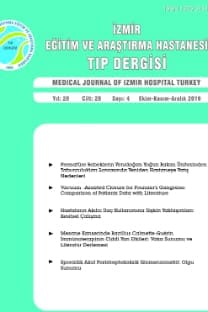BATIN İÇİNDE YAYGIN KİST HİDATİKLİ BİR OLGU
Tüm dünyada en yaygın ve ciddi insan sestod hastalığı kist hidatiktir. Ekinokokus granulosus ve alveolaris multilokularis ile meydana gelen zoonotik bir enfeksiyondur. Ekinokokus granulosus E. granulosus , hayvancılık yapılan ülkelerde endemiktir. Ülkemizde E. granulosus ile meydana gelen enfeksiyonlar daha sıktır E. alveolaris ülkemizde azdır, daha çok kuzey yarıkürede yaygındır. Kistler sıklıkla karaciğerde ve akciğerlerde yerleşir. Karaciğer ve akciğer dışı organlarda görülme oranı ise %1020’dir. İştahsızlık, kilo kaybı, halsizlik gibi semptomlar veya tekrarlayan ürtiker ve anjioödem ya da bulunduğu organa özgü bulgular ile seyreder. Spontan veya travma ile ya da cerrahi girişim sırasında kist içeriği saçılarak anaflaksi veya dissemine enfeksiyon gelişebilir. Karında şişlik, nefes alıp vermede zorluk yakınması ile hastanemize başvuran batın içinde yaygın kist hidatik enfestasyonu saptanan 8 yaşında kız olgu spontan ruptür ve/veya disseminasyon düşünülerek sunulmuştur
Anahtar Kelimeler:
kist hidatik, disseminasyon
A CASE WITH DISSEMINATED ABDOMINAL HYDATIDOSIS
Hydatid disease is the most widespread, serious human cestode infection in the world. Two Echinococcus species are responsible for distinct clinical presentations, E. granulosus and E. multilocularis alveolaris . Because animal breeding is widespread in our country, Turkey is endemic for E. granulosus The majority of cysts occur in the liver. The second most common site is the lungs. 10-20 % of all hydatid disease cases are in organs other than liver and lungs. Loss of appetite, weight loss, vomiting, abdominal pain, anaphylaxis or symptoms due to the site of the cysts are seen. Cyst contents may be spilled spontaneously or perioperatively or after a trauma and disseminated hydatid disease may be the result. An 8 year-old girl referred to our hospital with complaints of difficulty in breathing and abdominal distention diagnosed as disseminated hydatidosis is presented
Keywords:
hydatid disease, disseminated,
___
- Özçelik U, Göçmen A. Kist Hidatik Hastalığı Katkı Pediatri Dergisi 1992; (13) (3-4) 365-71.
- Blanton R. Echinococcosis Nelson Textbook of Pediatrics 2000, Ch 300, p 1079-81.
- Salman N. Kist Hidatik Pediatri 1 Neyzi O, Ertuğrul T. 1993, 732-33.
- Ockenga J, Gebel M, Topalidis T. Boozari B, Bleck J., Manns MP. 3D-ultrasound imaging, diagnosis and follow up of an atypical hydatid cyst. Z Gastrenterol 1998 Jul 36:7 599-603.
- Kalinowska Nowak A, Begejowicz C. Current principles for diagnosis and treatment of hydatid disease. Przegl Lek 2001 58:3 143-6.
- Sinan T, Sheikh M, Chisti FA, Al Saeed O, Sheikh Z, Hira PR, Behbehani A. Diagnosis of abdominal hdatid cyst disease: the role of USG and USG-guided fine needle aspiration cytology, Med Princ Pract 2002 Oct-Dec 11;190-5.
- Xu M, Yu L, Shi M, He X. Diagnosis and classification of hepatic echinococcosis by ultrasonography. Chin Med J (Engl) 1998 Apr 111;346-50.
- Polat P, Kantacı M, Alper F, Suma S, Koruyucu MB, Okur A. Hydatid disease from head to toe. Radiographics 2003 Mar-Apr 23:2 475-94;quiz 536-7.
- Deger E, Hokelek M, Deger BA, Asil M, Pakdemirli E. A new therapeutic approach for the treatment of cystic echinococcosis: percutaneous albendazole sulphoxide injection without reaspiration Am J Gastroenterol 2000 Jan 95:1 248-54.
- ISSN: 1305-5151
- Başlangıç: 1995
- Yayıncı: İzmir Bozyaka Eğitim ve Araştırma Hastanesi
Sayıdaki Diğer Makaleler
Ayşen KIZILYAR, Salih SADIK, Muzaffer SANCI, Çiğdem İSPAHİ, Ebru ŞAHİN, M Fatih YÜZBAŞIOĞLU, Gülçin Uğurel AYDAR
BATIN İÇİNDE YAYGIN KİST HİDATİKLİ BİR OLGU
Yağ Greft İle MİRİNGOPLASTİ, Fat Plug MYRINGOPLASTY
ANİ İŞİTME KAYIPLARI VE SONUÇLARIMIZ
Ejder CİĞER, M Doğan ÖZKUL, İbrahim ÇUKUROVA
NADİR BİR AKUT BATIN SEBEBİ: ABDOMİNAL KOZA OLGU SUNUMU
Fatih YÜZBAŞIOĞLU, Hasan SAYHAN, Ahmet AYKAS, Nazif ALTINER, Önder BİRGİ
KOLOSTOMİ KAPATMA KOMPLİKASYONLARI
Fatih YÜZBAŞIOĞLU, Hasan SAYHAN, Tufan ÇOLAK, N Nazif ALTINER, Arif Karagöz Hüsnü GÜRSU
HASTALARIN ANESTEZİ, ANESTEZİST VE GÖREVLERİ HAKKINDAKİ BİLGİ DÜZEYLERİ: ANKET ÇALIŞMASI
